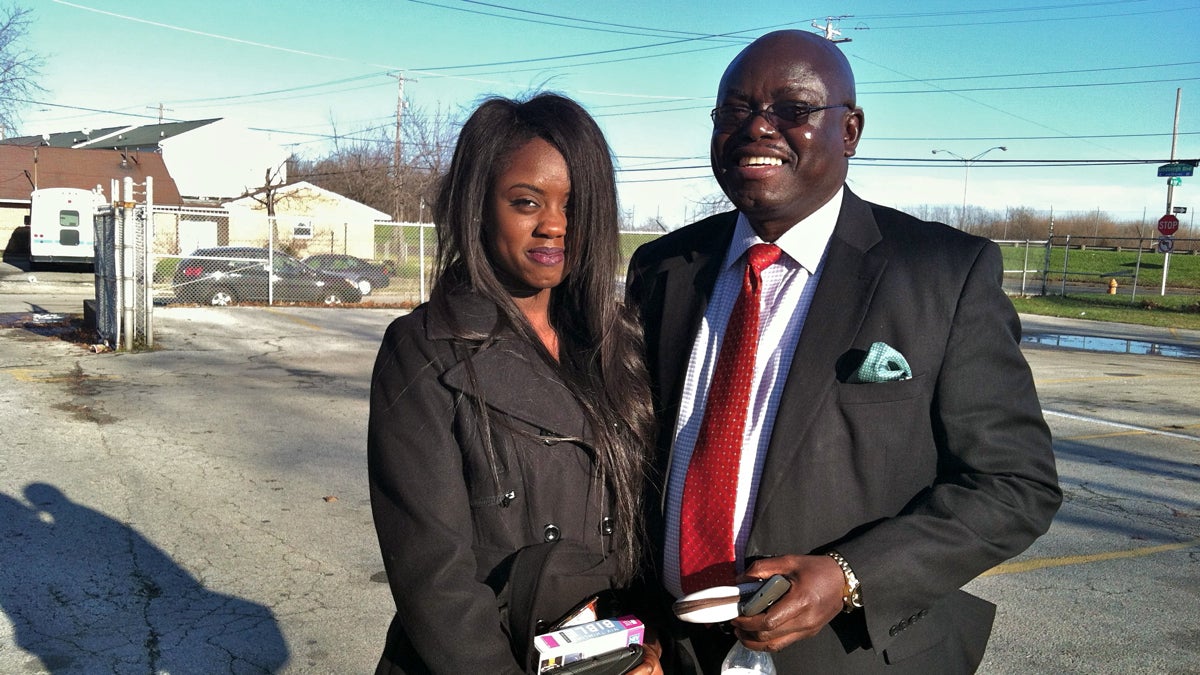Philly-based mental health specialist returns to Liberia
Listen
Psychotherapist Kpangbala Sengbe and his daughter Bendu, 17. (Elana Gordon/WHYY)
For many West African immigrants in the Philadelphia region, the Ebola epidemic is not some distant, abstract problem.
Just ask Dr. Kpangbala Sengbe, a Liberian-born psychotherapist.
Based in Philadelphia for more than a decade, Sengbe has been on the front lines both locally and in Liberia, helping people deal with the emotional impact of this deadly illness and the continuing aftermath of a long civil war that ended in 2003.
Sengbe most recently returned from his last trip in mid-August, at the height of the epidemic after working in crisis centers in Monrovia. But he says it has been difficult for people in Philadelphia, too.
“Because every time you get up in the morning, somebody is being informed that their relative or friends have died of the Ebola crisis,” said Sengbe, upon returning to Philadelphia. “So there is major trauma taking place in Liberia and in the United States.”
Over the last four months, Sengbe has been busy catching up with his children here and working in his brother’s church, offering grief counseling and support to those affected by the Ebola epidemic. He has also been working with others to develop more sustained service programs there.
But while many immigrants have postponed holiday travel to regions affected by Ebola, two weeks ago Sengbe decided to return.
Sengbe acknowledges there’s some risk in going back right now, but he plans to take precautions. Health officials still report about a dozen new Ebola infections in Liberia each day, but the number of cases is starting to drop.
Though he feels a pull to stay with family in Philadelphia, Sengbe said his country needs him and others who can bring back their expertise. It’s time, he said, to start rebuilding.
“When you have a crisis, most times in people’s psychology, they don’t process the total negative effect of the crisis until after the crisis,” he said. “When everything subsides, and Liberia is declared Ebola free, then now we’ll start to have these challenges.”
That includes psychological breakdowns, he said. Untreated, that can lead to physical ailments and broader community problems.
So Sengbe, a former junior minister of health in Liberia, said he plans to work with professionals on the ground, setting up health hubs geared toward helping survivors, family members, and health workers rebuild their lives, especially emotionally. That mental health component, he said, is too often overlooked.
Sengbe’s brother, meanwhile, a senior pastor at Victory Harvest Fellowship International in Philadelphia, announced Sengbe’s departure during last Sunday’s church service.
Some members were shocked, Sengbe said. They all prayed for him.
The toughest part of his decision to go back is having to leave his four kids. His 17-year-old daughter, Bendu Sengbe, accompanied him to church that day and said she’s proud of what her dad is doing, even though she does worry about him.
“I miss him every time he goes, but it’s for a good cause,” she said. “So it’s good.”
Sengbe gets a bit teary-eyed. The approval of his children and wanting to make them proud, he said, are what inspire him.
“I’ll miss you guys a lot … but somebody has to do something,” he said. “The fact that you, your siblings, are giving me the opportunity to serve my people is for me the biggest gift a parent would want from their child.”
Sengbe leaves for Liberia on Saturday.
Bendu said that whenever she wants to talk with her dad, she’ll send him a text.
He plans to return to Philadelphia in the spring.
Editor’s Note: An earlier version of this story incorrectly identified the day Sengbe will leave for Liberia.
WHYY is your source for fact-based, in-depth journalism and information. As a nonprofit organization, we rely on financial support from readers like you. Please give today.

